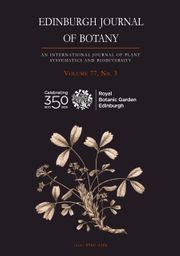Crossref Citations
This article has been cited by the following publications. This list is generated based on data provided by
Crossref.
Plunkett, Gregory M.
and
Lowry, Porter P.
2001.
Relationships among “Ancient Araliads” and Their Significance for the Systematics of Apiales.
Molecular Phylogenetics and Evolution,
Vol. 19,
Issue. 2,
p.
259.
Liu, M.
van Wyk, B‐E.
and
Tilney, P. M.
2002.
The taxonomic value of fruit structure in the Chinese endemic genus Dickinsia (Apiaceae).
Nordic Journal of Botany,
Vol. 22,
Issue. 5,
p.
603.
Liu, Mei (Rebecca)
van Wyk, Ben-Erik
and
Tilney, Patricia M.
2003.
The taxonomic value of fruit structure in the subfamily Saniculoideae and related African genera (Apiaceae).
TAXON,
Vol. 52,
Issue. 2,
p.
261.
Liu, M (Rebecca)
Shi, L.
van Wyk, B.-E.
Tilney, P.M.
and
Friis, I.B.
2003.
Fruit anatomy of the genus Bupleurum (Apiaceae) in northeastern China and notes on systematic implications.
South African Journal of Botany,
Vol. 69,
Issue. 2,
p.
151.
Sanderson, Michael J.
and
Driskell, Amy C.
2003.
The challenge of constructing large phylogenetic trees.
Trends in Plant Science,
Vol. 8,
Issue. 8,
p.
374.
Erbar, C.
Leins, P.
van Wyk, B.-E.
and
Tilney, P.M.
2004.
Sympetaly in Apiales (Apiaceae, Araliaceae, Pittosporaceae).
South African Journal of Botany,
Vol. 70,
Issue. 3,
p.
458.
Bininda-Emonds, Olaf R.P.
2004.
The evolution of supertrees.
Trends in Ecology & Evolution,
Vol. 19,
Issue. 6,
p.
315.
van Wyk, B.-E.
Tilney, P.M.
and
van Staden, J.
2004.
Diversity of Apiaceae in Africa.
South African Journal of Botany,
Vol. 70,
Issue. 3,
p.
433.
Baum, Bernard R.
and
Ragan, Mark A.
2004.
Phylogenetic Supertrees.
Vol. 4,
Issue. ,
p.
17.
Eulenstein, Oliver
Chen, Duhong
Burleigh, J. Gordon
Fernández-Baca, David
Sanderson, Michael J.
and
Kim, Junhyong
2004.
Performance of Flip Supertree Construction with a Heuristic Algorithm.
Systematic Biology,
Vol. 53,
Issue. 2,
p.
299.
Yi, Tingshuang
Lowry, Porter P.
Plunkett, Gregory M.
and
Wen, Jun
2004.
Chromosomal evolution in Araliaceae and close relatives.
TAXON,
Vol. 53,
Issue. 4,
p.
987.
Leins, P.
Erbar, C.
van Wyk, B.-E.
and
Tilney, P.M.
2004.
Floral organ sequences in Apiales (Apiaceae, Araliaceae, Pittosporaceae).
South African Journal of Botany,
Vol. 70,
Issue. 3,
p.
468.
Judd, Walter S.
and
Olmstead, Richard G.
2004.
A survey of tricolpate (eudicot) phylogenetic relationships .
American Journal of Botany,
Vol. 91,
Issue. 10,
p.
1627.
Plunkett, G.M.
Chandler, G.T.
Lowry, P.P.
Pinney, S.M.
Sprenkle, T.S.
van Wyk, B.-E.
and
Tilney, P.M.
2004.
Recent advances in understanding Apiales and a revised classification.
South African Journal of Botany,
Vol. 70,
Issue. 3,
p.
371.
Kerr, Alexander M.
2005.
Molecular and morphological supertree of stony corals (Anthozoa: Scleractinia) using matrix representation parsimony.
Biological Reviews,
Vol. 80,
Issue. 4,
p.
543.
Artyukova, E. V.
Gontcharov, A. A.
Kozyrenko, M. M.
Reunova, G. D.
and
Zhuravlev, Yu. N.
2005.
Phylogenetic Relationships of the Far Eastern Araliaceae Inferred from ITS Sequences of Nuclear rDNA.
Russian Journal of Genetics,
Vol. 41,
Issue. 6,
p.
649.
Liu, Mei (Rebecca)
Plunkett, Gregory M.
Lowry, Porter P.
Wyk Van, Ben‐Erik
and
Tilney, Patricia M.
2006.
The taxonomic value of fruit wing types in the order Apiales.
American Journal of Botany,
Vol. 93,
Issue. 9,
p.
1357.
Andersson, Lennart
Kocsis, Marianna
and
Eriksson, Roger
2006.
Relationships of the genus Azorella (Apiaceae) and other hydrocotyloids inferred from sequence variation in three plastid markers.
TAXON,
Vol. 55,
Issue. 2,
p.
270.
Liu, Mei (Rebecca)
Van Wyk, Ben-Erik
and
Tilney, Patricia M.
2007.
A revision of the genus Choritaenia (Apiaceae).
South African Journal of Botany,
Vol. 73,
Issue. 2,
p.
184.
Liu, Mei (Rebecca)
Van Wyk, Ben-Erik
and
Tilney, Patricia M.
2007.
Irregular vittae and druse crystals in Steganotaenia fruits support a taxonomic affinity with the subfamily Saniculoideae (Apiaceae).
South African Journal of Botany,
Vol. 73,
Issue. 2,
p.
252.




